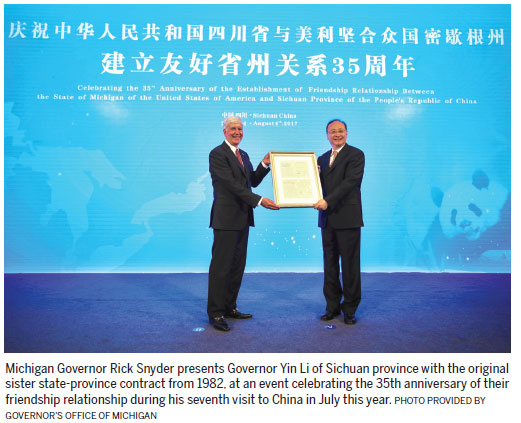Michigan-China connection deepens

The Great Lakes State is one of the top US destinations for Chinese investment.
Governor Rick Snyder is a main reason why.
Michigan Governor Rick Snyder considers the Michigan-China relationship among his top international priorities. Since taking office in January 2011, Governor Snyder has led seven trade and investment missions to China, one each year, and plans to make his eighth trip there in 2018. In this exclusive interview with China Daily, Snyder airs his views on a variety of topics, ranging from trade, investment and technology innovation to tourism, education exchange and the goals set by the recently concluded 19th National Congress of the Communist Party of China.
Q: Michigan is among the top states in the US attracting Chinese direct investment, while big-name companies from Michigan are also actively investing in China. What is the current status of Chinese direct investment in your state, and why has Michigan become a hot spot for Chinese investment? What is your projection for two-way investment in the years to come?
A: It's true that Michigan has been one of the top destinations in the country for investment from China. More and more companies are choosing to invest here each day. They want to join Michigan's world-leading industries, harness Michigan talent and innovation and enjoy the Michigan lifestyle.
Michigan is home to more than 300 Chinese companies and more than $4 billion in investments, not to mention our 12,000 Chinese students, and 30 Chinese community organizations. The strength of our state's Chinese community makes it easy for a Chinese company to invest here and succeed. We even have a state-funded nonprofit, the Michigan-China Innovation Center, with a bilingual staff that is dedicated to assisting potential Chinese investors. I expect more investment will come.
Q: Subnational (state-to-province) level trade, economic cooperation and investment play an important role in fostering a stronger and healthier China-US business relationship. You have made seven business trips to China since 2011, telling Chinese investors that "there is no better place in North America for Chinese companies to expand than in Michigan". Can you tell us why, and also note what you believe have been the major achievements of your previous trips to China. How do you value the state-province level exchange and cooperation? Do you plan to make another visit to China in the near future? If so, please tell us the timing of the visit, the places you are going to visit and your main goals.
A: The Michigan-China relationship has been among my top international priorities since taking office. I've led seven trade and investment missions to China, one every year I've been in office, and I plan to make my eighth and final trip in 2018. I tell Chinese investors that there is no better place for them to expand than in Michigan because, well, I believe that it is true. Chinese investors are extremely savvy and looking to find the best value for their money - Michigan is exactly that. Michigan has a greatly improved business environment, currently ranked No. 7 in the country. Plus, talent and real estate are high quality and affordable, and the cost of living is lower than that of any other state or metropolitan area in the Midwest.
Q: You have a strong business background and have been seeking to create a pro-business environment in Michigan, focusing on job-creating business growth and investment. What role can Chinese investors play in your campaign of Reinventing Michigan?
A: Chinese companies can do a lot to contribute, along with our other foreign businesses. Foreign direct investment is important because it creates jobs and increases the state's economic competitiveness. When a Chinese company comes to Michigan and establishes an R&D center, for example, it brings high-paying jobs, innovation, and opportunities to develop collaborative programs with Michigan businesses.

Q: Michigan is home to the Big Three US auto companies. In the past several decades, many of the Chinese companies that have invested in Michigan are involved in automobile R&D and components manufacturing. As electronic and driverless cars are the future of the auto industry, what will your administration do to support companies (including Chinese-invested firms) to strengthen e-car and driverless car R&D and cooperation?
A: Michigan is the global leader in assisting and promoting the development of new energy and autonomous vehicles. Our autonomous-vehicle test track, MCity, has been oversubscribed for some time, and we are at work building a new test track, opening next year, that's 10 times the size. In addition, we have passed laws helping companies test and operate autonomous vehicles on Michigan's roads. And the Michigan Department of Transportation has hundreds of miles of public highway that have sensors installed to interact with test vehicles and compile huge amounts of data.
With China, we have entered into cooperative agreements with A Nice City in Shanghai, with the Chinese Association of Automotive Manufacturers (CAAM) and CCPIT-Auto. And Chinese automotive companies and suppliers have been flooding into Michigan to learn about our plans and explore their entry into the North American market.
Q: Michigan is second only to California among all US states in the diversity of agriculture and a leading grower of fruits in the US. What's the status of agricultural trade and cooperation between Michigan and China? What does the future look like in agriculture cooperation?
A: It's certainly correct that Michigan is an agricultural powerhouse; it's our second-biggest industry in Michigan. Huge amounts of agricultural commodities from Michigan are exported to China each year. At the same time, we still face some regulatory hurdles to exporting great Michigan products - like blueberries - to China. We're working on that. Michigan is also a center for food safety education and training, and some of our institutes have trained officials from China.
Q: E-commerce plays an increasingly important role in bilateral trade as a large number of Chinese consumers shop for foreign goods via e-commerce platforms. How will Michigan make use of such platforms to further promote its trade with China?
A: There are a number of great Michigan brands selling online in China. Just on Alibaba's TMall, for example, we have Michigan companies selling, including Buick, Jeep, Ford, Graceland Fruit, Gerber, Dow Corning, Carhartt, Kellogg's, Kitchen Aid, Herman Miller and Whirlpool. These are very popular brands in China, and we're glad to see Chinese consumers excited about them.
Q: In your previous trips to China, you held a few events in Beijing and Guangzhou, promoting Pure Michigan Tourism. Could you please tell us more about Pure Michigan Tourism? What role can tourism play in promoting people-to-people friendship? What segments of Chinese tourists does the Pure Michigan Tourism mainly target? Does Michigan have plans to launch new promotional campaigns for Pure Michigan Tourism in China?
A: Pure Michigan tourism highlights Michigan's beautiful and indispensable tourism industry - our third-biggest industry in the state! We love for people from other countries to come and enjoy Michigan's tourism resources, such as our lakes - both the Great Lakes, and 11,000 inland lakes. Typically we understand that Chinese tourists don't visit Michigan on their first trip to the USA. But we like to get them on their subsequent trips. Our Pure Michigan team is busy promoting our great destinations to Chinese tourists from its offices in China.
Q: China and the US recently completed their first social and people-to-people dialogue in Washington DC. Educational cooperation is one important aspect. What is the current situation of educational cooperation and exchange between Michigan and China? How do you see the future prospects of such cooperation?
A: Michigan's universities, led by University of Michigan, Michigan State and Wayne State, have terrific collaborations with Chinese universities. These include student exchanges, faculty exchanges and joint research in a variety of fields. We expect these collaborations to grow a great deal in the coming years, and they contribute a lot to mutual understanding.
Q: We've learned that your daughter Kelsey is studying Mandarin at the University of Michigan, and studying Chinese language is a trend among young Americans. Why do you think this has occurred? What do you see as the role of young people in further promoting friendship and cooperation between our two great countries?
A: American students understand that the US-China relationship is the most important bilateral relationship in the world. Many students are choosing to learn Chinese in preparation for careers in international business and politics. It's so important that our young people in America and China are able to build friendships and deepen their cross-cultural understanding.
Q: What do you think have been the major developments in the economic, technology, cultural and other fields since your first visit to China in 2011?
A: Certainly, we've seen China place a high priority on domestic innovation and technology during this period, as it moves to elevate and transform China's economy. This process takes a long time, but we're seeing some effects already.
Q: What has been your personal experience with this development?
A: We've met with many political and business leaders in China that are interested in increasing technological capacity in China's economy through domestic innovation initiatives and through acquisitions abroad. There are many ways we can work together on this for the benefit of both China and states like Michigan.
Q: What do you expect for the next five years and beyond as China is about to draft its development blueprint for the next five years?
A: Yes, I understand that the 19th Party Congress has laid out goals through 2050! I understand that the first phase is about creating a moderately prosperous society. Many of the regions I've visited in China are already beyond moderately prosperous, and I expect there will be a focus on reducing the income and wealth gaps between China's diverse regions.
yuanzhang@chinadailyusa.com
| Michigan Governor Rick Snyder introduces Pure Michigan tourism program to people in Hangzhou, capital city of Zhejiang province, China, during his sixth visit to China in November 2016. Photo Provided By Governor’s Office Of Michigan |


(China Daily USA 11/03/2017 page20)
Today's Top News
- Xi chairs CPC leadership meeting to discuss draft 15th Five-Year Plan, govt work report
- China steps up preparations for crewed lunar mission
- China's import growth good for world trade
- HK to set up key industrial innovation site
- Major battery breakthrough paving way for EV upgrade
- Meetings promise shared growth































